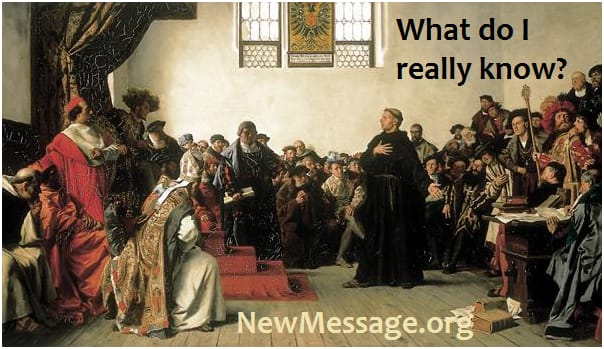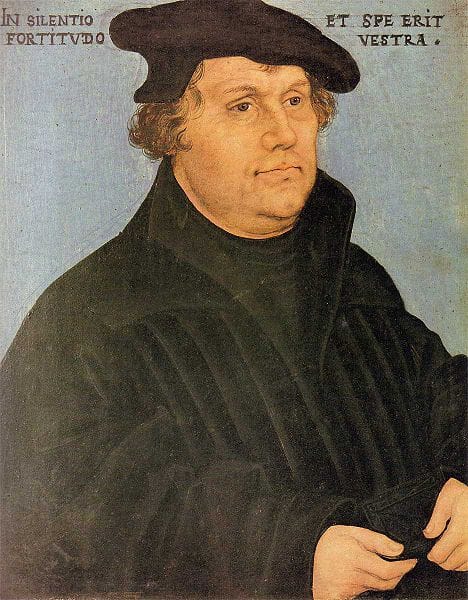
An important event in the history of Christianity occurred almost exactly 500 years ago. The event is the defense of Martin Luther (1483-1546) at the Diet [Assembly] of Worms of 1521. This defense was given on April 18, 1521.
What did Martin Luther really know?
This controversy began in October of 1517, when Luther posted the 95 Theses on the door of the church in Wittenburg. The 95 Theses were a rebuke of the sale of papal indulgences. Basically, by purchasing an indulgence, an individual could reduce the length and severity of punishment that heaven would require as payment for their sins, or so the church claimed.
Luther was summoned to the Diet of Worms to respond to the Papal Bull of 1520, and either recant or reaffirm his views. The events of April 18 are well documented. I find most of Luther’s defense to be relatively ordinary. I believe he considered it his duty to expose corruption in the church. If he were to recant, he would be enabling corrupt practices. He admitted to harsh tone, but not to the substance of his indictments. But there was something he said at the end of his defense that struck like thunder for me.
“Unless I am convinced by the testimony of the Scriptures or by clear reason (for I do not trust either in the pope or in councils alone, since it is well known that they have often erred and contradicted themselves), I am bound by the Scriptures I have quoted and my conscience is captive to the Word of God. I cannot and will not recant anything, since it is neither safe nor right to go against conscience. May God help me. Amen.”
While Luther was declared a heretic in May of 1521 by Emperor Charles V, he found safety under the protection of Frederick III, Elector of Saxony. During this time, Luther began a German translation of the Bible.
Responding to a deeper conscience
What did Martin Luther really know? I believe Martin Luther responded to a deeper conscience. This deeper conscience is called “Knowledge” by the New Message from God. Here is a description of this deeper conscience. It is found in the revelation “How to Live.”
“This deeper conscience [that God has placed within you] is not your social conscience. It is not what you have been taught to believe, or to think you must do, or what society says is right and wrong, proper or improper. Your fundamental conscience is deeper than this. It is established within you and all sentient beings. But in this world and in other worlds as well, this deeper conscience can go unrecognized, and social conditioning can replace it as a criteria for how to live and how to establish the guidelines for what is proper and creative and beneficial, and what is not.
Society’s conscience is very compromised. It may hold high values, but it does not insist upon highly ethical behavior. It may claim to have the moral high ground, but once you begin to consider its application, it is full of compromises and accommodations.
God has placed a deeper conscience within you, a conscience called Knowledge. It is the Knowledge of what is right and wrong. Even if intellectually you find yourself at an impasse regarding deciding something, whether it is right or wrong, at a deeper level you can discern the truth. You may experience a conundrum within your intellect as ideas clash and values clash at the surface of your mind, but deeper down beneath the surface of your mind is God’s deeper Conscience. Here the right decision can be made—even if it is expensive, even if it creates disadvantages in the moment, even if it seems to deprive you of opportunities or approval from others.
This deeper Knowledge that God has placed within you is entirely ethical and moral, but at a greater level. It is uncompromising. It is powerful. And people who can respond to this end up being the great humanitarians and the great innovators. They hold humanity to a higher standard. They reveal injustices. They speak of a greater moral and civic responsibility. While others fall into a life of conflict and compromise, they hold to a higher standard. These individuals are often maligned and rejected in their own lives and sometimes celebrated after they pass away, after they are no longer a social problem, an irritant.”
What does it mean to know something?
It could also be said that Martin Luther knew something. What does it mean to know something, according to the standard of Knowledge? I have tried to describe this on multiple occasions. My current attempt is this. To know something is to “to experience something as self-evident, and needing all the love I can give.” I say that by that definition, Martin Luther knew something. He knew that the practice of indulgences was a manipulation of religious sentiment for financial gain. He knew the Church found this arrangement to be acceptable. He knew that the people needed revelation in their own language to resist this manipulation.
Christians around the world are celebrating the 500th anniversary of Martin Luther’s defense. I am grateful for Martin Luther’s response to his deeper conscience. I am grateful for Martin Luther knowing something. When someone knows something, the world moves forward.
Welcome to Mystery of Ascension! We are students and advocates of the the New Message from God. We are members of a worldwide community. We seek to assist the world in successfully navigating difficult times ahead. We seek to assist the world in successfully emerging into a greater community of intelligent life. You will also find some poetry. Find out more about us here. Contact us here.


